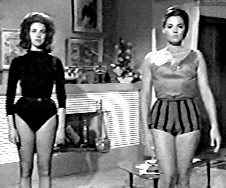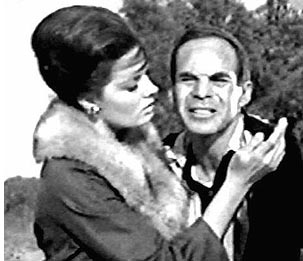

[To the Beat of the Twist]
1962
Prod: Guillermo Calderón Stell; Dir: Benito Alazraki; Scr: Alfredo Salazar; Photo: Enrique Wallace; Music Dir: Antonio Díaz Conde; Prod Mgr: Jorge Mondragón R.; Prod Chief: Luis Bustos; Sub-Dir: Jaime L. Contreras; Film Ed: Jorge Bustos; Art Dir: José Rodríguez Granada; Decor: Ernesto Carrasco; Makeup: Felisa L. de Guevara; Sound Supv: James L. Fields; Rec: Eduardo Arjona; Re-rec: Galdino Samperio; Sound Ed: José Li Ho; Union: STPC
CAST: Manuel "Loco" Valdés (Matusalén Capulín), Beto el Boticario (Beto Boticas), María Eugenia Rubio (María Eugenia), Elizabeth Campbell (Jo), Erica Carlsson (Peggy), Lisa Rossell (Lisa), Joaquín García "Borolas" (Lopitos), Luis Aragón (Pedro Montesco), Jorge Mondragón (Renato Capulín), Julián de Meriche (Pierre), José Ruiz Vélez (fashion show ancr), Alberto Vázquez (Alberto Vázquez), León Barroso (Prof. Secante), Victorio Blanco (Alberto's grandfather), Lupe Carriles (Renato's secretary), ?Carlos Henning (jury member), Lorena Velázquez (dancer at party); BANDS: Los Teen Tops, The Crazy Boys (vocalist Luis "Vivi" Hernández), Los Hooligans, Los Beatniks, Los Rebeldes del Rock (vocalist Johnny Laboriel)

NOTES:
this is a wildly uneven film, with good musical interludes but terrible comedy routines. It is mostly notable as Elizabeth Campbell's second Mexican film (shot in February 1962); she and the equally statuesque Erika Carlsson (who had minor roles in numerous Mexican movies well into the '80s) are showcased in a variety of costumes throughout the film, towering over the various other performers (they are introduced in leotards, doing exercises; in the final sequence, Carlsson displays a lot of cleavage, and Campbell once more demonstrates her remarkable resemblance to Ann-Margret). Cast as gringas (and pretty obviously intended to be high-class call girls), Campbell and Carlsson speak mostly Spanish (but some English), and even though they are allied with the film's villain for most of the movie, are generally sympathetic characters.The songs are generally good: the film opens with Johnny Laboriel and the Teen Tops doing a version of "Calendar Girl," which is followed by Los Beatniks and the "Tampico Twist" (which is reprised, via a record, later). María Eugenia Rubio sings "Cándida" (which she also performs in Juventud rebelde, so it must have been her signature hit), Alberto Vázquez does a rather lame slow song, but Los Hooligan's [sic] then perform "Agujetas de color de rosa." Laboriel and the Teen Tops come back for "Melodía de amor," The Crazy Boys do "La pulga," and the Teen Tops wind up the picture with "Popotitos." Most of these songs were hits and some are even remembered as "classics" of early '60s Mexican rock and roll.
Matusalén (i.e., Methuselah) is the "oldest student" at the university (his sidekick Beto is the second-oldest), and shows no sign of ever wanting to graduate. He spends most of his time goofing off in class. In one scene, a professor asks him "Where the Goths came from." Matusalén thinks he said "codos" [cheapskates] rather than "godos" [Goths], and replies "The codos come from Monterrey!" (this is a joke based on the tightwad reputation of residents of Monterrey) Matusalén and Beto are pursued by the awkward and plain María Eugenia and Lisa.

Renato, Matusalén's uncle, decides to take a long vacation from his post as head of the Capulín bathing suit company. He gives the reluctant Matusalén the job: if Matusalén is a success, Renato will sponsor his studies in England, but if the company goes broke, Matusalén will be cut off without a cent. Renato's chief competitor is Pedro Montesco; Pedro and his assistant Lopitos want to take advantage of Renato's absence to ruin Capulín out of business. They hire Jo and Peggy to seduce Matusalén and Beto. Jo (seeing Matusalén): "He looks like an idiot." Pedro: "He is an idiot." At the Capulín fashion show, Jo and Peggy introduce themselves to the new management duo. María Eugenia and Lisa are jealous, and constantly follow Matusalén and Beto around, foiling the men's attempts to be alone with the beautiful gringas.
Pedro issues a challenge to the Capulín company, and a fashion competition is arranged. On the eve of the show, acting on information he got from Jo and Peggy, Pedro steals the new Capulín bathing suits and substitutes old-fashioned designs in their places. Pedro's models are stealing the show, but Jo and Peggy repent and tell Matusalén where his bathing suits are hidden. The suits are recovered and with Jo, Peggy, María Eugenia and Lisa as models (the latter two have undergone makeovers and are now attractive), Pedro is defeated. Lisa gives a demonstration of her drumming ability, then dances in a revealing costume, and the film concludes with everyone dancing to "Popotitos."
As noted above, the comedy sequences in A ritmo de twist are not
very good. Loco Valdés and María Eugenia Rubio do an unfunny
skit in their college classroom; later, Valdés and Beto el
Boticario disguise themselves as plumbers and waiters, with obviously
 false noses and moustaches, but the laughs just won't come. There is also
a puzzling and pointless scene where the two comedians dress up in
football uniforms and "practice" American football indoors. Both Loco
Valdés and Beto el Boticario can be amusing, but you'd never know
it from watching this movie.
false noses and moustaches, but the laughs just won't come. There is also
a puzzling and pointless scene where the two comedians dress up in
football uniforms and "practice" American football indoors. Both Loco
Valdés and Beto el Boticario can be amusing, but you'd never know
it from watching this movie.
Conversely, the rest of the cast is decent (Lorena Velázquez can even be spotted, in an unbilled bit as a party guest in the opening sequence). The four primary actresses are all good, although Rubio and Rossell are hampered by the "ugly" makeup and costumes they wear for most of the movie. As in Santo en el hotel de la muerte, Rossell shows that she can play the drums and while her dancing isn't anything special (it's just the twist, after all), she looks good while doing it.
Overall, a film of some historical interest, but very uneven.
[NOTE: In 1972, Alfredo Salazar remade A ritmo de twist as Bikinis y rock, this time handling both directing and scripting chores. Loco Valdés returned, but in a role which did not exist in the first film; the protagonists this time were Ricardo Cortés and Lalo el Mimo (in the Valdés and Beto el Boticario roles), along with Verónica Castro and Olga Breeskin (in the Rubio and Rossell parts).]
Back to the Elizabeth Campbell Filmography.
This review posted 16 Oct 2000 by D. Wilt (dwilt@umd.edu). Vid caps added 8 November 2000. Images (c) Cin. Calderón.